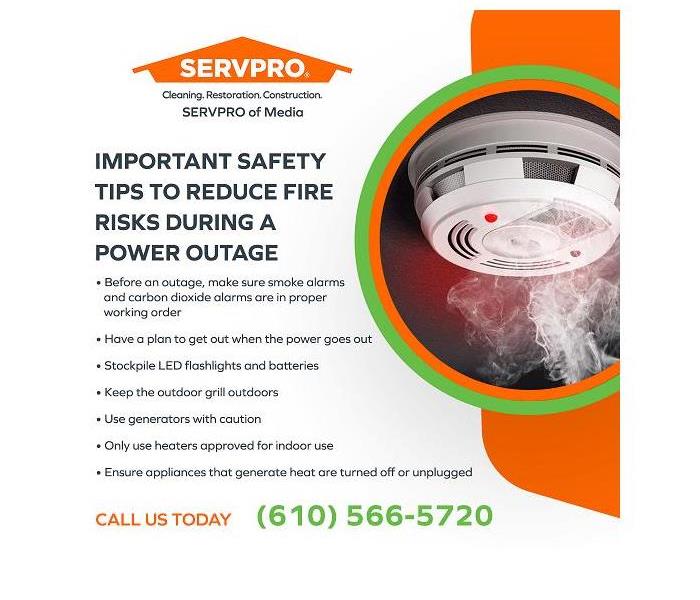Fire Safety Tips for Power Outages Resulting from Severe Weather and Storm Damage
8/11/2022 (Permalink)
Blog Summary: SERVPRO of Media explains how an electrical failure from storm damage can increase fire hazards. The damage restoration company also shares fire safety tips to prevent fire damage after severe weather.
SERVPRO of Media is well acquainted with the fire risks caused by power outages from storm damage. The team also realizes that a power outage can be inconvenient. However, it is easy for homeowners to be lulled into a false sense of security when the power goes out and the lights go down. An outage does not eliminate the potential for a secondary fire risk not directly associated with electrical current. Even though no electrical current from the power station is flowing through the wires into the home, it does not mean the system cannot be hot. The following tips shed light on some of the fire risks caused by a power outage in Newtown Square, PA.
To reduce fire risks during a power outage, the team at SERVPRO of Media, PA, offers the following important safety tips:
Tip #1: Before an outage, make sure smoke alarms and carbon dioxide alarms are in proper working order.
Do not be alarmed when the power goes out, but make sure that backup battery-operated smoke alarms and carbon monoxide alarms are functioning and have batteries that are less than a year old. Alarms connected directly into the electrical system will not work during a power failure unless they have a battery backup. When the skies are clear, install battery-only smoke and CO alarms to ensure the home is safe from fire and CO poisoning 24/7, power or no power.
Tip #2: Have a plan to get out when the power goes out.
Prepare and practice an evacuation plan that gets everyone safely out of the home during an emergency. The evacuation may be difficult and dangerous if the power is out. Everyone should know how to quickly and safely exit the house in near or total darkness. Areas of the home may be completely dark during the daylight hours, so do not count on the need for the evacuation to occur when the sun is shining. A basement can be instantly shrouded in darkness in the middle of the day if a storm or fire knocks out the power.
Tip #3: Stockpile LED flashlights and batteries.
LED flashlights and lanterns offer long hours of bright illumination and are many times more efficient than traditional flashlights. LED bulbs are durable and can take a pounding. Candles and oil lanterns pose a serious fire hazard and should only be used as a last resort.
Tip #4: Keep the outdoor grill outdoors.
During a winter power outage, it may be tempting to use a gas grill to heat the home. This practice is extremely dangerous. Stay safe by keeping the outdoor grill outdoors and only using it for cooking.
Tip #5: Use generators with caution.
The generator should be UL approved and suited for the purpose for which it was purchased. Avoid overloading the unit. It should have proper connection receptacles and circuit breakers. Never operate a gasoline or propane generator in the home. Follow the manufacturer’s instructions for proper operation and maintenance, and store fuel in a safe, dry place at least fifty feet from any structure.
Tip #6: Only use heaters approved for indoor use.
Snow, sleet, ice, and frigid temperatures can disrupt the power grid during the winter. Open windows to allow for adequate ventilation. Fire risks are high when the unit is still hot. Let the unit cool before taking it outside the home for refueling.
Tip #7: Ensure appliances that generate heat are turned off or unplugged.
If the power went out during meal preparation, it is easy to forget the stove was in use. If the power comes on, the results could be disastrous. Unattended cooking is one of the leading causes of home fires. Curlers, a curling iron, a hair dryer, an iron, a bathroom space heater, or other heat-generating devices can cause a fire damage disaster when the power returns.
What to do after storm damage or fire damage
Residents and businesses can call the team at SERVPRO of Media when fire damage, storm damage, or any other property damage disaster strikes. The dedicated professionals at SERVPRO are available 24/7, 365 days a year, including holidays. They arrive on-scene in about an hour to inspect the damage and provide a detailed, well-documented estimate to the homeowner. In addition, SERVPRO can handle the insurance claims process from beginning to end.
To learn more details about SERVPRO of Media’s water removal services, call the storm damage restoration company at (610) 566-5720 or email office@SERVPROmedia.com





 24/7 Emergency Service
24/7 Emergency Service
